Publications
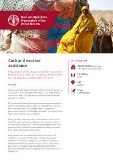
Cash and voucher assistance: Providing live-saving assistance to enable vulnerable families to cope with crises or shocks and promoting resilient agricultural livelihoods for the future
06/2023
Through its cash and voucher assistance programmes, the Food and Agriculture Organization of the United Nations (FAO) provides immediate relief to vulnerable households while also helping them to protect their assets from shocks (e.g. drought, illness, conflict, poor production), overcome cash shortages, promote their livelihoods and improve their food security and nutrition.
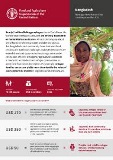
Bangladesh: Rohingya Humanitarian Crisis Joint Response Plan 2023
06/2023
Nearly 1 million Rohingya refugees live in Cox’s Bazar, the world’s largest refugee camp, and are entirely dependent on humanitarian assistance.

The Sudan: DIEM – Data in Emergencies situation overview
06/2023
In collaboration with the FAO Representation in the Sudan, the FAO Subregional Office for Eastern Africa, the FAO Regional Office for Near East and North Africa, and the FAO Inclusive Rural Transformation and Gender Equality Division, this DIEM – Data in Emergencies situation overview presents the potential impacts of the ongoing conflict on agriculture and food security in the Sudan.

Iraq: Protecting Iraqi farmers by anticipating drought and water shortages
06/2023
In Iraq, years of conflict and instability have damaged vital agricultural infrastructure, leaving already vulnerable people at further risk of increased food insecurity.

Pakistan: DIEM – Data in Emergencies Monitoring brief, round 4
06/2023
This Data in Emergencies Monitoring (DIEM-Monitoring) brief shares the results of a fourth-round assessment conducted in February and March 2023 in Pakistan.
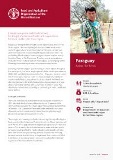
Paraguay: Appeal for funds
06/2023
Paraguay is facing extreme drought, which is particularly critical in the Chaco region – the country’s largest, least populated, most remote and arid region, characterized by limited rainfall, sandy eroded soils and desert temperatures – due to the “triple episode” of the La Niña phenomenon.
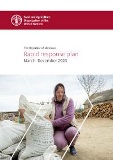
The Republic of Moldova: Rapid response plan, March–December 2023
06/2023
The compounded impacts of the war in Ukraine and adverse climatic conditions underline the urgency of supporting the livelihoods of the most vulnerable farming households in the Republic of Moldova.

The Sudan: Revised Humanitarian Response Plan 2023
06/2023
The ongoing conflict in the Sudan, which erupted on 15 April, has worsened an already fragile food security situation.

Zimbabwe: DIEM – Data in Emergencies Monitoring brief, round 7
06/2023
This Data in Emergencies Monitoring (DIEM-Monitoring) brief shares the results of a seventh-round assessment conducted in March and April 2023 in Zimbabwe. I

Anticipating food crises – Common principles to address challenges relating to Anticipatory Action
06/2023
Anticipatory Action can play a critical role in disaster prevention efforts and in addressing the root causes of vulnerability to build resilience and help curb and reverse current food insecurity trends.
.tmb-th600x450.jpg?Culture=en&sfvrsn=1ef7b895_1)
Yemen: DIEM – Data in Emergencies Monitoring brief, round 6
06/2023
This Data in Emergencies Monitoring (DIEM-Monitoring) brief shares the results of a sixth-round assessment conducted in February and March 2023 in Yemen. I

Cameroon: DIEM – Data in Emergencies Monitoring brief, round 4
06/2023
This Data in Emergencies Monitoring (DIEM-Monitoring) brief shares the results of a fourth-round assessment conducted in March and April 2023 in Cameroon.

Central African Republic: DIEM – Data in Emergencies Monitoring brief, round 4
06/2023
This Data in Emergencies Monitoring (DIEM-Monitoring) brief shares the results of a fourth-round assessment conducted in February and March 2023 in the Central African Republic.

Afghanistan: Project Highlights – OSRO/AFG/121/ITA
06/2023
The Government of the Republic of Italy contributed USD 3 507 014 to improve the livelihoods and food security of 25 600 rural households (240 658 people) in Badghis, Laghman, Sare Pul and Uruzgan provinces of Afghanistan.

Sri Lanka: DIEM – Data in Emergencies Monitoring brief, round 1
06/2023
This Data in Emergencies Monitoring (DIEM-Monitoring) brief shares the results of a first assessment conducted between September and November 2022 in Sri Lanka.

Bangladesh: DIEM – Data in Emergencies Monitoring brief, round 7
06/2023
This Data in Emergencies Monitoring (DIEM-Monitoring) brief shares the results of a seventh-round assessment conducted in February and March 2023 in Bangladesh.

Ethiopia: Humanitarian Response Plan 2023
06/2023
Ethiopia continues to face several overlapping crises, in particular conflict and record drought, which have resulted in poor crop production, limited access to markets to buy and sell produce, loss of income and high levels of malnutrition and food insecurity.

Hunger Hotspots: FAO-WFP early warnings on acute food insecurity, June 2023 to November 2023 outlook
05/2023
The Food and Agriculture Organization of the United Nations (FAO) and the United Nations World Food Programme (WFP) warn that acute food insecurity is likely to deteriorate further in 18 hunger hotspots during the outlook period from June to November 2023.

Democratic Republic of the Congo: DIEM – Data in Emergencies Monitoring brief, round 5
05/2023
This Data in Emergencies Monitoring (DIEM-Monitoring) brief shares the results of a fifth-round assessment conducted in February and March 2023 in the Democratic Republic of the Congo.
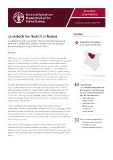
Livestock for health in Kenya
05/2023
The Food and Agriculture Organization of the United Nations in collaboration with the United Nations Children's Fund, Washington State University and other stakeholders undertook a research-oriented project referred to as ‘Livestock for Health’ (L4H), implemented between August 2018 and September 2022 in Marsabit County, an arid land located in northern Kenya.
